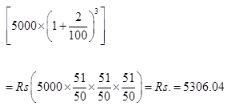Important Short Tricks to solve Compound Interest Questions
To make the chapter easy for you all, we are providing you all some Important Short Tricks to solve Compound Interest Questions which will surely make the chapter easy for you all.
Important Short Tricks to solve Compound Interest Questions
Compound Interest :- Sometimes it so happens that the borrower and the lender agree to fix up a certain unit of time, say yearly or half-yearly or quarterly to settle the precious account.
In such cases, the amount after first unit of times becomes the principal for the second unit the amount after second unit becomes the principle for the third unit and so on.
After a specified period, the difference between the amount and the money borrowed is called the Compound Interest (abbreviated as C.I.) for that period.
Important Facts & Formulas on Compound Interest
Case 1: Let principle = P, time = n years and rate = r% per annum and let A be the total amount at the end of n years, then

Example: Albert invested an amount of Rs.8000 in a fixed deposit scheme for 2 years at compound interest rate 5 p.c.p.a. how much amount will Albert get on maturity of the fixed deposit.
Solution:
Amount = Rs.

Case 2: When compound interest is reckoned half-yearly.
If the annual rate is r% per annum and is to be calculated for n years, then in this case, rate = (n/2%) half-yearly and time = (2n) half-yearly.
Form the above we get

Example: Sam investment Rs.15,000 @ 10% per annum for one year. If the interest is compounded half-yearly, then the amount received by Sam at the end of the year will be.
Solution:
P = Rs. 15000; R = 10% p.a = 5% half-year, T = 1 year = 2 half year
Amount = Rs

= Rs.16537.50
Case 3: When compound interest is reckoned quarterly.
In this case, rate = (r/4%) quarterly and time = (4n) quarter years.
As before,

Example:
Find the compound interest on Rs. 15,625 for 9 months at 16% per annum compounded quarterly.
Solution:
P = Rs. 15625, n= 9 months = 3 quarters, R = 16% p.a. = 4% per quarter.
Amount = Rs.

= Rs.17576
C.I = Rs. (17576 – 15625 ) = Rs. 1951.
Note: The difference between the compound interest and the simple interest over two years is given by

Case 4: When interest is compounded annually but time is in fraction, say years.
Amount =

Example:
What is the difference between the compound interest on Rs. 5000 for at 4% per annum compounded yearly and half-yearly?
Solutions:
C.I. when interest is compounded yearly
= Rs.

= Rs.5304
C.I. when interest is compounded half-yearly

Difference = Rs.(5306.04 – 5304 ) = Rs.2.04.
Case 5: Present worth of Rs.x due n years hence is given by:
Present Worth =

Example:
The principle that amounts to Rs.4913 in 3 years at per annum compound interest compounded annually, is :
Solution:
Principle = Rs.

We hope you all like the post. Don't forget to share your feedback with us in the comment box.
No comments:
Post a Comment